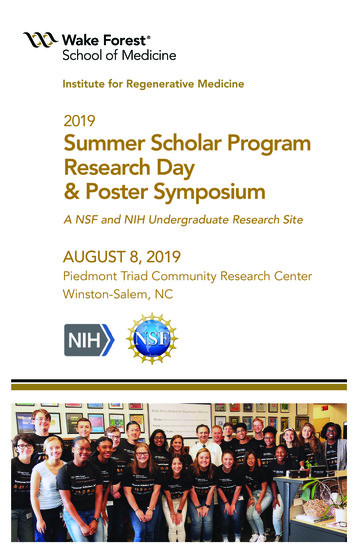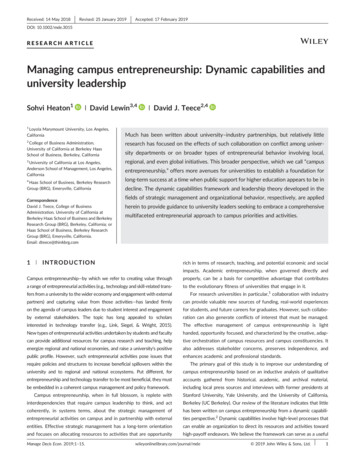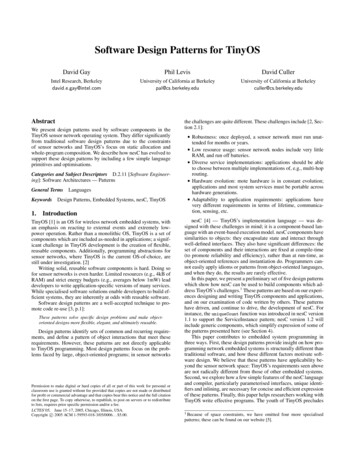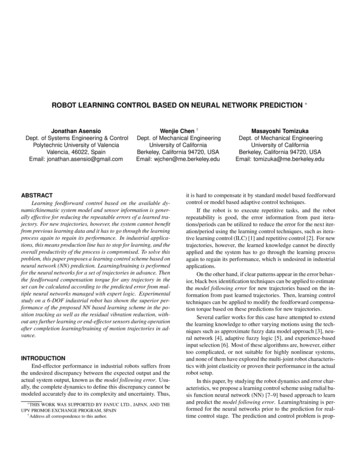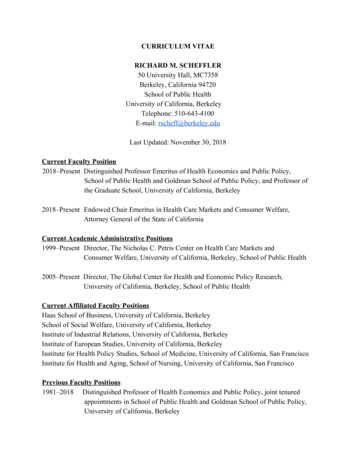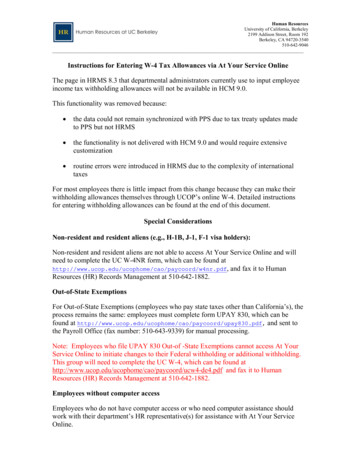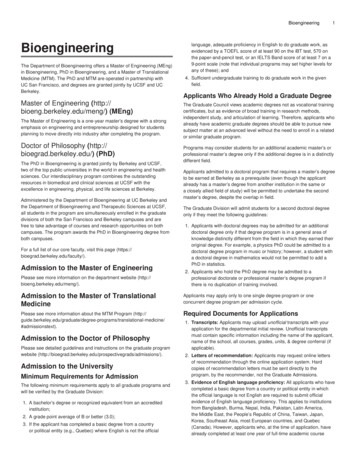
Transcription
BioengineeringBioengineeringThe Department of Bioengineering offers a Master of Engineering (MEng)in Bioengineering, PhD in Bioengineering, and a Master of TranslationalMedicine (MTM). The PhD and MTM are operated in partnership withUC San Francisco, and degrees are granted jointly by UCSF and UCBerkeley.Master of Engineering (http://bioeng.berkeley.edu/meng/) (MEng)The Master of Engineering is a one-year master’s degree with a strongemphasis on engineering and entrepreneurship designed for studentsplanning to move directly into industry after completing the program.Doctor of Philosophy (http://bioegrad.berkeley.edu/) (PhD)The PhD in Bioengineering is granted jointly by Berkeley and UCSF,two of the top public universities in the world in engineering and healthsciences. Our interdisciplinary program combines the outstandingresources in biomedical and clinical sciences at UCSF with theexcellence in engineering, physical, and life sciences at Berkeley.Administered by the Department of Bioengineering at UC Berkeley andthe Department of Bioengineering and Therapeutic Sciences at UCSF,all students in the program are simultaneously enrolled in the graduatedivisions of both the San Francisco and Berkeley campuses and arefree to take advantage of courses and research opportunities on bothcampuses. The program awards the PhD in Bioengineering degree fromboth campuses.For a full list of our core faculty, visit this page (https://bioegrad.berkeley.edu/faculty/).Admission to the Master of EngineeringPlease see more information on the department website (http://bioeng.berkeley.edu/meng/).language, adequate proficiency in English to do graduate work, asevidenced by a TOEFL score of at least 90 on the iBT test, 570 onthe paper-and-pencil test, or an IELTS Band score of at least 7 on a9-point scale (note that individual programs may set higher levels forany of these); and4. Sufficient undergraduate training to do graduate work in the givenfield.Applicants Who Already Hold a Graduate DegreeThe Graduate Council views academic degrees not as vocational trainingcertificates, but as evidence of broad training in research methods,independent study, and articulation of learning. Therefore, applicants whoalready have academic graduate degrees should be able to pursue newsubject matter at an advanced level without the need to enroll in a relatedor similar graduate program.Programs may consider students for an additional academic master’s orprofessional master’s degree only if the additional degree is in a distinctlydifferent field.Applicants admitted to a doctoral program that requires a master’s degreeto be earned at Berkeley as a prerequisite (even though the applicantalready has a master’s degree from another institution in the same ora closely allied field of study) will be permitted to undertake the secondmaster’s degree, despite the overlap in field.The Graduate Division will admit students for a second doctoral degreeonly if they meet the following guidelines:1. Applicants with doctoral degrees may be admitted for an additionaldoctoral degree only if that degree program is in a general area ofknowledge distinctly different from the field in which they earned theiroriginal degree. For example, a physics PhD could be admitted to adoctoral degree program in music or history; however, a student witha doctoral degree in mathematics would not be permitted to add aPhD in statistics.2. Applicants who hold the PhD degree may be admitted to aprofessional doctorate or professional master’s degree program ifthere is no duplication of training involved.Admission to the Master of TranslationalMedicineApplicants may apply only to one single degree program or oneconcurrent degree program per admission cycle.Please see more information about the MTM Program s/translational-medicine/#admissionstext).Required Documents for ApplicationsAdmission to the Doctor of PhilosophyPlease see detailed guidelines and instructions on the graduate programwebsite issions/).Admission to the UniversityMinimum Requirements for AdmissionThe following minimum requirements apply to all graduate programs andwill be verified by the Graduate Division:1. A bachelor’s degree or recognized equivalent from an accreditedinstitution;2. A grade point average of B or better (3.0);3. If the applicant has completed a basic degree from a countryor political entity (e.g., Quebec) where English is not the official11. Transcripts: Applicants may upload unofficial transcripts with yourapplication for the departmental initial review. Unofficial transcriptsmust contain specific information including the name of the applicant,name of the school, all courses, grades, units, & degree conferral (ifapplicable).2. Letters of recommendation: Applicants may request online lettersof recommendation through the online application system. Hardcopies of recommendation letters must be sent directly to theprogram, by the recommender, not the Graduate Admissions.3. Evidence of English language proficiency: All applicants who havecompleted a basic degree from a country or political entity in whichthe official language is not English are required to submit officialevidence of English language proficiency. This applies to institutionsfrom Bangladesh, Burma, Nepal, India, Pakistan, Latin America,the Middle East, the People’s Republic of China, Taiwan, Japan,Korea, Southeast Asia, most European countries, and Quebec(Canada). However, applicants who, at the time of application, havealready completed at least one year of full-time academic course
2Bioengineeringwork with grades of B or better at a US university may submit anofficial transcript from the US university to fulfill this requirement. Thefollowing courses will not fulfill this requirement: courses in English as a Second Language, courses conducted in a language other than English, courses that will be completed after the application is submitted,and courses of a non-academic nature.Applicants who have previously applied to Berkeley must also submit newtest scores that meet the current minimum requirement from one of thestandardized tests. Official TOEFL score reports must be sent directlyfrom Educational Test Services (ETS). The institution code for Berkeleyis 4833 for Graduate Organizations. Official IELTS score reports mustbe sent electronically from the testing center to University of California,Berkeley, Graduate Division, Sproul Hall, Rm 318 MC 5900, Berkeley, CA94720. TOEFL and IELTS score reports are only valid for two years priorto beginning the graduate program at UC Berkeley. Note: score reportscan not expire before the month of June.Where to ApplyVisit the Berkeley Graduate Division application page culumThe course requirements are designed to develop a strong and usefulknowledge base in both biology and engineering. In general, the programof study includes a major and a minor field of study. Due to the widevariety of topics included in bioengineering and the variety of studentinterests, major and minor subfields will be chosen by the student inconsultation with their primary graduate adviser, taking into account thestudent’s prior training, research interests, and career goals. Studentswho already hold a master’s or other professional degree (MD, DDS, orDVM) may not be required to complete minor coursework.All students in the Program must complete the following courserequirements: Area Requirements (see below) Major Area and Minor AreaMajor 16 semester (24 quarter) units. Minor 8 semester (12quarter) units. First Year Seminars: Bioengineering 200 (UCB) and Bioengineering280/281 (UCSF) Bioengineering Teaching Techniques: Bioengineering 301 (UCB) Ethics: Bioengineering 201 (UCB) or equivalent, taken in the first andfourth yearsAll students in the Ph.D. program are required to have completed,at some time during their academic career, the Area Requirementsdescribed below. Most students will have completed some of thesecourses prior to initiating the Ph.D. program; any remaining courseworkwill be integrated into the graduate program of study. Anatomy, physiology, and biology: 9 semester or 13.5 quarter units ofupper division or graduate level coursework. Biochemistry and/or intermediate chemistry: 3 semester or 4.5quarter units of upper division or graduate level coursework. Engineering and/or computer science: 7 semester or 10.5 quarterunits of upper division or graduate level coursework. Mathematics and/or statistics: 2 semester or 3 quarter units of upperdivision or graduate level coursework.Laboratory RotationsStudents should perform three 12-week rotations in different graduategroup faculty laboratories during the first year. The objective of theresearch rotation is to allow students to become familiar with differentareas of research, learn new experimental techniques, obtain experiencein unique research laboratories, and ultimately to identify a lab in whichto conduct dissertation research. The research being performed during arotation may correspond to the initial stages of a thesis project or may beon an entirely different topic.TeachingAnticipating future careers which may include teaching, all graduatestudents participate in undergraduate instruction by serving as aGraduate Student Instructor for at least one semester.Qualifying ExaminationAn oral qualifying examination must be taken in the spring of thesecond year or the fall of the third year. In this examination, studentsdemonstrate their ability to recognize research problems of fundamentalimportance, to propose appropriate experimental approaches to addressthese problems and to display comprehensive knowledge of theirdisciplinary area and related subjects.Dissertation WorkAfter advancing to candidacy, a student meets each fall semester withhis or her thesis committee to discuss the dissertation project, to reviewresults, and to chart directions for their third and subsequent years. Inthe final years in the program, students complete a dissertation basedon original laboratory research. It generally takes five and a half years tocomplete the doctoral program.Please see the graduate program website for more details. /)Core RequirementsThe Bioengineering MEng Degree requires a minimum 25 total unitsof course credit, a capstone report and presentation, and passingthe leadership and technical comprehensive exams. Courseworkrequirements fall across three areas – technical bioengineering (12 units),leadership (8 units), and capstone (5 units).1. Technical Electives – Bioengineering Courses [12 units]Students must take a minimum of 12 credits of 200-levelBioengineering courses for a letter grade, selected within any of our 7technical concentrations (https://bioeng.berkeley.edu/meng/), or anyBioengineering courses across those concentrations.2. Leadership Courses [8 units]Two boot camp short courses in mid-August (One unit each)ENGIN 270AOrganizational Behavior for Engineers1ENGIN 270BR&D Technology Management & Ethics1Two units of boot camp short courses in early January. Select two ofany of the one-unit electives (Note: Electives listed below are subjectto change)
Bioengineering3ENGIN 270DEntrepreneurship for Engineers1Biomedical Engineering DesignENGIN 270GMarketing & Product Management1BIO ENG 221LBioMEMS and BioNanotechnology Laboratory4ENGIN 270HAccounting & Finance for Engineers1BIO ENG 224Basic Principles of Drug Delivery3ENGIN 270ITechnology Strategy for Engineering Leaders1BIO ENG C237Adv Designing for the Human Body4ENGIN 270JIndustry Analysis for Engineering Leaders1BIO ENG C250Nanomaterials in Medicine3ENGIN 270LGlobal Leadership Expertise1BIO ENG 252Clinical Need-Based Therapy Solutions2ENGIN 270MProfessional Ethics in Technology, Law andBusiness1BIO ENG 253Biotechnology Entrepreneurship: Impact, History,Therapeutics R&D, Entrepreneurship & Careers2ENGIN 270CTeaming & Project Management (fall)1ENGIN 270KCoaching for High Performance Teams (spring)1Two units of ENGIN 295 Communications (One unit in fall and oneunit in spring)Biomedical ImagingBIO ENG 252Clinical Need-Based Therapy Solutions2BIO ENG C261Medical Imaging Signals and Systems4BIO ENG 263Principles of Molecular and Cellular Biophotonics43. Capstone Experience [5 units]BIO ENG 263LMolecular and Cellular Biophotonics Laboratory4Students must be enrolled in ENGIN 296MA in the fall (1-2 units) andENGIN 296MB in the spring (3-4 units), for a total of 5 units total overboth semesters.Biomaterials & Biomedical DevicesENGIN 295Communications for Engineering Leaders [1]BIO ENG C208Biological Performance of Materials4BIO ENG C215Molecular Biomechanics and Mechanobiology ofthe Cell4BIO ENG C216Macromolecular Science in Biotechnology andMedicine4BIO ENG 221Advanced BioMEMS and Bionanotechnology4BIO ENG 221LBioMEMS and BioNanotechnology Laboratory4BIO ENG C223Polymer Engineering3BIO ENG 224Basic Principles of Drug Delivery3BIO ENG C237Adv Designing for the Human Body4BIO ENG C250Nanomaterials in Medicine3BIO ENG 252Clinical Need-Based Therapy Solutions2BIO ENG 253Biotechnology Entrepreneurship: Impact, History,Therapeutics R&D, Entrepreneurship & Careers24. Comprehensive Exams – Leadership & TechnicalLeadership: The Fung Institute will administer a written exam for thefall leadership portion of the curriculum. Students should be prepared tospend a designated day to complete the degree requirement LeadershipComprehensive Exam.Technical: The Bioengineering Technical Comprehensive Exam willtake place late in the Spring semester (generally during RRR week)and will consist of a 20 minute minimum presentation on your Capstoneproject. The presentation will be assessed by a BioE faculty memberand an allied field member (for example, if a project is in ME, the secondassessor must be in ME). Students will be asked probing questionsduring the presentation and answers given will determine a pass. Ifa student fails the presentation requirement, they will be given theoption to give the presentation again the following Fall semester. Failureto pass the exam on the third attempt will constitute a failure of thecomprehensive exam requirement for the MEng degree.General BioengineeringBIO ENG C208Biological Performance of Materials4BIO ENG C209Advanced Orthopedic Biomechanics4BIO ENG C215Molecular Biomechanics and Mechanobiology ofthe Cell4BIO ENG C216Macromolecular Science in Biotechnology andMedicine4ConcentrationsBIO ENG 221Advanced BioMEMS and Bionanotechnology4Students earning this degree will choose a track (concentration) ofcoursework in one of these seven fields. Please see the requirements foreach concentration below:BIO ENG 221LBioMEMS and BioNanotechnology Laboratory4BIO ENG 224Basic Principles of Drug Delivery3BIO ENG 225Biomolecular Structure Determination3BIO ENG 231Introduction to Computational Molecular andCellular Biology4Please visit the Bioengineering Department nts/) website ts/) for more details.Bioinformatics & Computational BiologyBIO ENG 225Biomolecular Structure Determination3BIO ENG 235Frontiers in Microbial Systems Biology4BIO ENG 231Introduction to Computational Molecular andCellular Biology4BIO ENG C237Adv Designing for the Human Body4BIO ENG 241Probabilistic Modeling in Computational Biology4BIO ENG 235Frontiers in Microbial Systems Biology4BIO ENG 247Principles of Synthetic Biology4BIO ENG 241Probabilistic Modeling in Computational Biology4BIO ENG 248Introduction to Machine Learning forComputational Biology4Bioenergy and Sustainable Chemical Synthesis:Metabolic Engineering and Synthetic BiologyApproaches3BIO ENG 245BIO ENG 245Introduction to Machine Learning forComputational Biology4BIO ENG C250Nanomaterials in Medicine3
4BioengineeringBIO ENG 252Clinical Need-Based Therapy Solutions2BIO ENG 253Biotechnology Entrepreneurship: Impact, History,Therapeutics R&D, Entrepreneurship & Careers2BIO ENG C261Medical Imaging Signals and Systems4BIO ENG 263Principles of Molecular and Cellular Biophotonics4BIO ENG 263LMolecular and Cellular Biophotonics Laboratory4MechanobiologyBIO ENG C209Advanced Orthopedic Biomechanics4BIO ENG C215Molecular Biomechanics and Mechanobiology ofthe Cell4BIO ENG C237Adv Designing for the Human Body4Synthetic BiologyBIO ENG 201 Responsible Conduct inBioengineering Research and in Practice 1UnitTerms offered: Spring 2022, Spring 2020, Spring 2019This course will explore ethical issues likely to be faced by a bioengineer,and consider them in the context of responsible engineering. The contentof the class is designed considering the NSF Standards of EthicalConduct and the NIH Ethical Guidelines & Regulations in mind, andto serve as the Responsible Conduct of Research training for our PhDprogram.Responsible Conduct in Bioengineering Research and in Practice: ReadMore [ ]Objectives & OutcomesBIO ENG 225Biomolecular Structure Determination3BIO ENG 235Frontiers in Microbial Systems Biology4BIO ENG 245Introduction to Machine Learning forComputational Biology4Course Objectives: The content of the class is designed consideringthe NSF Standards of Ethical Conduct and the NIH Ethical Guidelines& Regulations in mind, and to serve as the Responsible Conduct ofResearch training for our PhD program.BIO ENG 247Principles of Synthetic Biology4Student Learning Outcomes: To prepare bioengineering PhD studentsto perform their research and design responsibly.BIO ENG 248Bioenergy and Sustainable Chemical Synthesis:Metabolic Engineering and Synthetic BiologyApproaches3Rules & RequirementsPrerequisites: Open only to Bioengineering graduate studentsBioengineeringHours & FormatExpand all course descriptions [ ]Collapse all course descriptions [-]Fall and/or spring: 10 weeks - 1 hour of lecture per weekBIO ENG 200 The Graduate GroupIntroductory Seminar 1 UnitAdditional DetailsTerms offered: Fall 2022, Fall 2021, Fall 2020An introduction to research in bioengineering including specific casestudies and organization of this rapidly expanding and diverse field.The Graduate Group Introductory Seminar: Read More [ ]Rules & RequirementsPrerequisites: Enrollment in PhD Program in Bioengineering or consentof instructorRepeat rules: Course may be repeated for credit without restriction.Hours & FormatFall and/or spring: 15 weeks - 1 hour of seminar per weekAdditional DetailsSubject/Course Level: Bioengineering/GraduateGrading: Offered for satisfactory/unsatisfactory grade only.The Graduate Group Introductory Seminar: Read Less [-]Subject/Course Level: Bioengineering/GraduateGrading: Offered for satisfactory/unsatisfactory grade only.Instructor: Terry JohnsonResponsible Conduct in Bioengineering Research and in Practice: ReadLess [-]
BioengineeringBIO ENG 202 Cell Engineering 4 UnitsBIO ENG 203 Tissue Engineering lab 4 UnitsTerms offered: Fall 2022, Fall 2021, Fall 2020This course will teach the main concepts and current views on keyattributes of animal cells (somatic, embryonic, pluripotent, germ-line; withthe focus on mammalian cells), will introduce theory of the regulationof cell function, methods for deliberate control of cell properties andresulting biomedical and bioengineering technologies.Cell Engineering: Read More [ ]Objectives & OutcomesTerms offered: Prior to 2007This class provides a conceptual and practical understanding of cell andtissue bioengineering that is vital for careers in medicine, biotechnology,and bioengineering. Students are introduced to cell biology laboratorytechniques, including immunofluorescence, quantitative image analysis,protein quantification, protein expression, gene expression, and cellculture.Tissue Engineering lab: Read More [ ]Objectives & OutcomesCourse Objectives: The goal of this course to establish fundamentalunderstanding of cell engineering technologies and of the key biologicalparadigms, upon which cell engineering is based, with the focus onbiomedical applications of cell engineering.Student Learning Outcomes: At the completion of this course studentswill understand how bioengineering technologies address the deliberatecontrol of cell properties (and how this advances biomedicine); andstudents will learn the main concepts and current views on key attributesof animal cells (somatic, embryonic, pluripotent, germ-line; with the focuson mammalian cells).Rules & RequirementsCourse Objectives: The goal of this course to provide students withconceptual and practical understanding of cell and tissue bioengineering.Student Learning Outcomes: At the completion of this course, studentswill learn key cellular bioengineering laboratory techniques, will develop aconceptual and theoretical understanding of the reliability and limitationsof these techniques and will enhance their skills in quantitative dataanalysis, interpretation and integration.Rules & RequirementsPrerequisites: BIO ENG 114 or BIO ENG 202, or BIO ENG 11; orconsent of instructorPrerequisites: BIOLOGY 1A or BIO ENG 11; or consent of instructorHours & FormatHours & FormatFall and/or spring: 15 weeks - 3 hours of lecture and 2 hours ofdiscussion per weekFall and/or spring: 15 weeks - 9 hours of laboratory and 1 hour oflecture per weekAdditional DetailsAdditional DetailsSubject/Course Level: Bioengineering/GraduateSubject/Course Level: Bioengineering/GraduateGrading: Letter grade.Grading: Letter grade.Instructor: ConboyInstructor: ConboyTissue Engineering lab: Read Less [-]Cell Engineering: Read Less [-]5
6BioengineeringBIO ENG C208 Biological Performance ofMaterials 4 UnitsBIO ENG C209 Advanced OrthopedicBiomechanics 4 UnitsTerms offered: Fall 2022, Fall 2021, Fall 2020This course is intended to give students the opportunity to expandtheir knowledge of topics related to biomedical materials selection anddesign. Structure-property relationships of biomedical materials and theirinteraction with biological systems will be addressed. Applications of theconcepts developed include blood-materials compatibility, biomimeticmaterials, hard and soft tissue-materials interactions, drug delivery, tissueengineering, and biotechnology.Biological Performance of Materials: Read More [ ]Objectives & OutcomesTerms offered: Fall 2022, Fall 2020, Fall 2019Students will learn the application of engineering concepts includingstatics, dynamics, optimization theory, composite beam theory, beamon-elastic foundation theory, Hertz contact theory, and materialsbehavior. Topics will include forces and moments acting on humanjoints; composition and mechanical behavior of orthopedic biomaterials;design/analysis of artificial joint, spine, and fracture fixation prostheses;musculoskeletal tissues including bone, cartilage, tendon, ligament,and muscle; osteoporosis and fracture-risk predication of bones; andbone adaptation. Students will be challenged in a MATLAB-basedproject to integrate the course material in an attempt to gain insight intocontemporary design/analysis/problems.Advanced Orthopedic Biomechanics: Read More [ ]Objectives & OutcomesCourse Objectives: The course is separated into four parts spanningthe principles of synthetic materials and surfaces, principles of biologicalmaterials, biological performance of materials and devices, and stateof-the-art materials design. Students are required to attend class andmaster the material therein. In addition, readings from the clinical, lifeand materials science literature are assigned. Students are encouragedto seek out additional reference material to complement the readingsassigned. A mid-term examination is given on basic principles (parts 1and 2 of the outline). A comprehensive final examination is given as well.The purpose of this course is to introduce students to problemsassociated with the selection and function of biomaterials. Throughclass lectures and readings in both the physical and life scienceliterature, students will gain broad knowledge of the criteria used toselect biomaterials, especially in devices where the material-tissue ormaterial-solution interface dominates performance. Materials used indevices for medicine, dentistry, tissue engineering, drug delivery, and thebiotechnology industry will be addressed.This course also has a significant design component ( 35%). Studentswill form small teams (five or less) and undertake a semester-long designproject related to the subject matter of the course. The project includesthe preparation of a paper and a 20 minute oral presentation criticallyanalyzing a current material-tissue or material-solution problem. Studentswill be expected to design improvements to materials and devices toovercome the problems identified in class with existing materials.Student Learning Outcomes: Work independently and function on ateam, and develop solid communication skills (oral, graphic & written)through the class design project. Develop an understanding of the social, safety and medicalconsequences of biomaterial use and regulatory issues associated withthe selection of biomaterials in the context of the silicone breast implantcontroversy and subsequent biomaterials crisis. Design experiments and analyze data from the literature in the context ofthe class design project. Understanding of the origin of surface forces and interfacial free energy,and how they contribute to the development of the biomaterial interfaceand ultimately biomaterial performance. Apply math, science & engineering principles to the understanding of softmaterials, surface chemistry, DLVO theory, protein adsorption kinetics,viscoelasticity, mass diffusion, and molecular (i.e., drug) delivery kinetics. Apply core concepts in materials science to solve engineering problemsrelated to the selection biomaterials, especially in devices where thematerial-tissue or material-solution interface dominates performance.Rules & RequirementsCourse Objectives: The purpose of this course is twofold: to learn the fundamental concepts of orthopaedic biomechanics; to enhance skills in mechanical engineering and bioengineering byanalyzing the mechanical behavior of various complex biomedicalproblems.Student Learning Outcomes: Working knowledge of variousengineering concepts such as composite beam theory, beam-on-elasticfoundation theory, Hertz contact theory and MATLAB-based optimizationdesign analysis. Understanding of basic concepts in orthopaedicbiomechanics and the ability to apply the appropriate engineeringconcepts to solve realistic biomechanical problems, knowing clearly theassumptions involved.Rules & RequirementsPrerequisites: ME C85/CE C30 or Bio Eng 102; concurrent enrollmentOK. Proficiency in MatLab or equivalent. Prior knowledge of biology oranatomy is not assumedCredit Restrictions: Students will not receive credit for this course if theyhave taken ME C176/Bio E C119.Hours & FormatFall and/or spring: 15 weeks - 3 hours of lecture, 1 hour of discussion,and 1 hour of laboratory per weekAdditional DetailsSubject/Course Level: Bioengineering/GraduateGrading: Letter grade.Instructors: O'Connell, KeavenyAlso listed as: MEC ENG C210Advanced Orthopedic Biomechanics: Read Less [-]
BioengineeringBIO ENG 211 Cell and TissueMechanotransduction 3 UnitsBIO ENG C213 Fluid Mechanics of BiologicalSystems 3 UnitsTerms offered: Fall 2018, Fall 2017, Fall 2016This course will focus on biophysical and bioengineering aspects ofmechanotransduction, the process through which living cells senseand respond to their mechanical environment. Students will learn howmechanical inputs to cells influence both subcellular biochemistry andwhole-cell behavior. They will also study newly-engineered technologiesfor force manipulation and measurement in living cells, and syntheticstrategies to control the mechanics and chemistry of the extracellularmatrix. Finally, students will learn about the role of mechanotransductionin selected human organ systems and how these mechanisms maygo awry in the setting of the disease. Instruction will feature lectures,discussions, analysis of relevant research papers, assembly of aliterature review and a research proposal, and an oral presentation.Cell and Tissue Mechanotransduction: Read More [ ]Rules & RequirementsTerms offered: Spring 2019, Spring 2016, Spring 2014Fluid mechanical aspects of various physiological systems, thecirculatory, respiratory, and renal systems. Motion in large and smallblood vessels. Pulsatile and peristaltic flows. Other biofluidmechanicalflows: the ear, eye, etc. Instrumentation for fluid measurementsin biological systems and for medical diagnosis and applications.Artificial devices for replacement of organs and/or functions, e.g. bloodoxygenators, kidney dialysis machines, artificial hearts/circulatory assistdevices.Fluid Mechanics of Biological Systems: Read More [ ]Rules & RequirementsPrerequisites: Undergraduate cell biology or consent of instructorHours & FormatFall and/or spring: 15 weeks - 3 hours of lecture per weekAdditional DetailsSubject/Course Level: Bioengineering/GraduateGrading: Letter grade.Instructor: KumarCell and Tissue Mechanotransduction: Read Less [-]BIO ENG C212 Heat and Mass Transport inBiomedical Engineering 3 UnitsTerms offered: Spring 2008, Fall 2007, Spring 2006, Spring 2005Fundamental processes of heat and mass transport in biological systems;organic molecules, cells, biological organs, whole animals. Derivationof mathematical models and discussion of experimental procedures.Applications to biomedical engineering.Heat and Mass Transport in Biomedical Engineering: Read More [ ]Rules & RequirementsPrerequisites: 106 and 109 (106 and 109 may be taken concurrently)Hours & FormatFall and/or spring: 15 weeks - 3 hours of lecture per weekAdditional DetailsSubject/Course Level: Bioengineering/GraduateGrading: Letter grade.Formerly known as: Mechanical Engineering 212Also listed as: MEC ENG C212Heat and Mass Transport in Biomedical E
be sent electronically from the testing center to University of California, Berkeley, Graduate Division, Sproul Hall, Rm 318 MC 5900, Berkeley, CA 94720. TOEFL and IELTS score reports are only valid for two years prior to beginning the graduate program at UC Berkeley. Note: score reports can not expire before the month of June. Where to Apply
